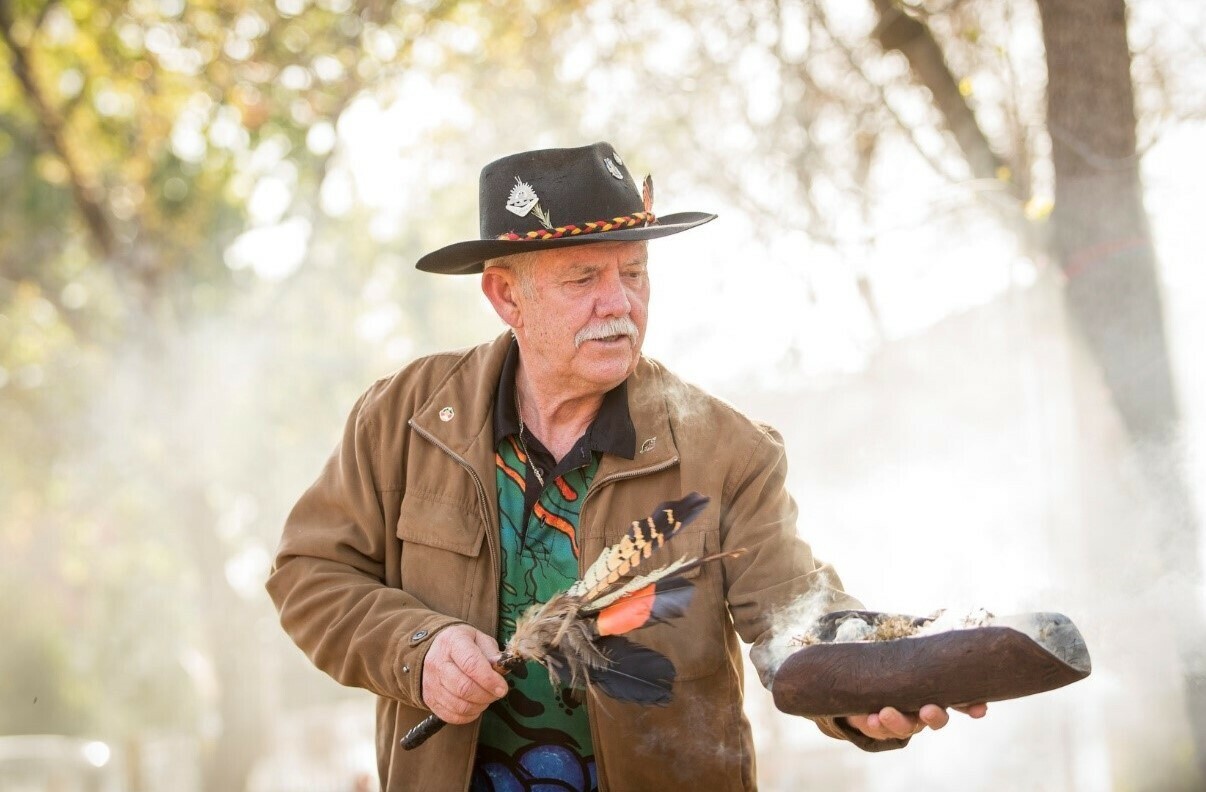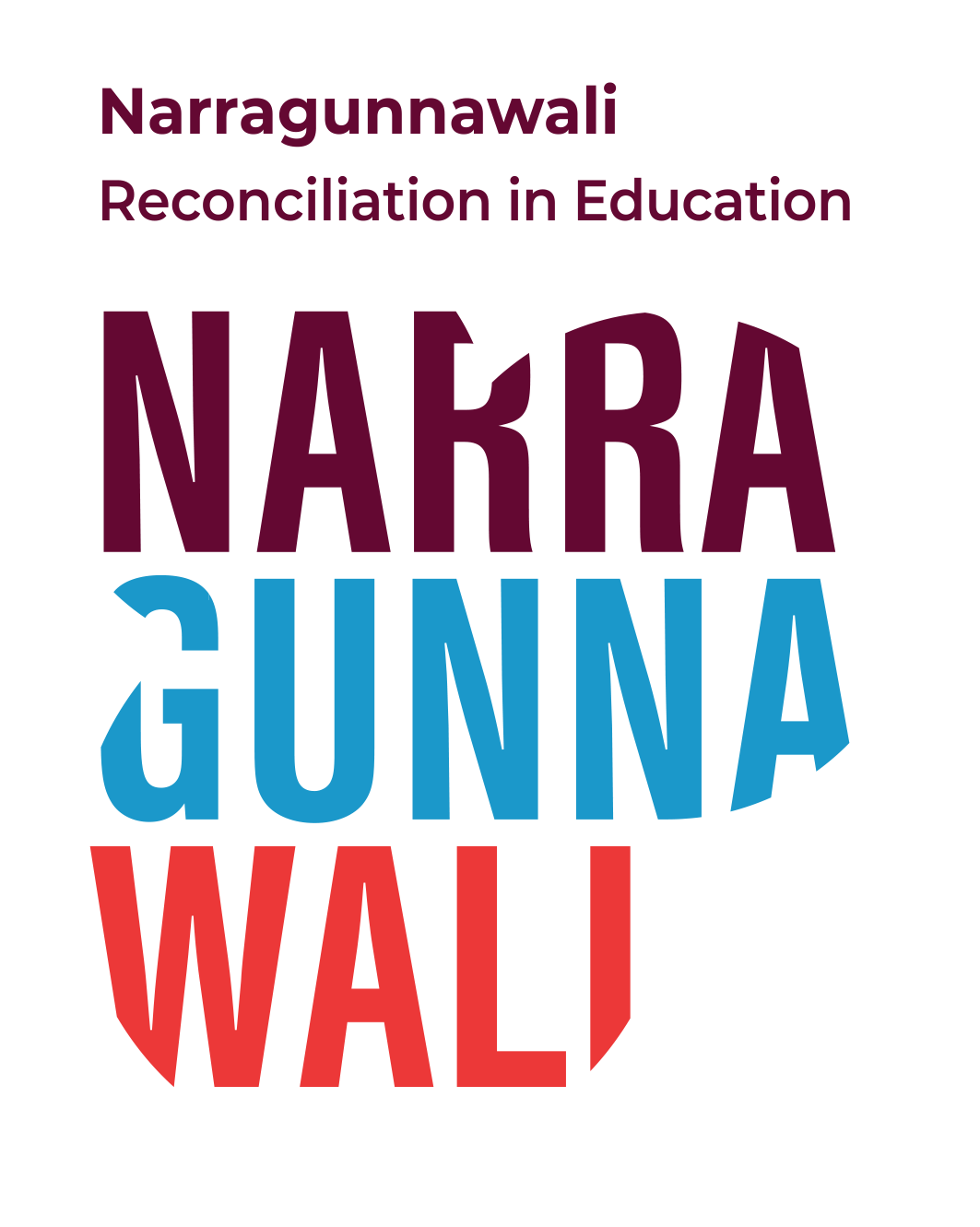Teacher Feature - Uncle Ivan Copley
Esma from the Narragunnawali team spoke with Uncle Ivan-Tiwu Copley about his work towards driving reconciliation in education. It’s our pleasure to share some of Uncle Ivan’s words of wisdom with the Narragunnawali community of practice.

Uncle Ivan performing a Cleansing Ceremony on Country in the Adelaide Hills. Image Supplied by Uncle Ivan.
Esma:
Please tell us a little bit about yourself. What's your name, who's your mob, and where are you from?
Uncle Ivan:
My name's Ivan-Tiwu Black Cockatoo Copley; I'm a descendant of the Kaurna people of the Adelaide Plains area through my mother's side and the Peramangk people, from the Mount Lofty Ranges region, through my father's side.
Esma:
What is your role in your community, and in education?
Uncle Ivan:
My role, now, getting older and that sort of stuff, is to pass the knowledge onto those that are listening, those with a really pure heart, and those, I believe, that have kindness and want to share that with other people, especially children and educators. I pass on what has been orally passed on to me through my family and my Elders, Uncles, and Aunties over many decades. I have that knowledge there and use it - because you can't take it to the grave with you!
Esma:
How did you hear about Reconciliation Australia’s Narragunnawali program?
Uncle Ivan:
I've known about the program for a long time! I was on the Reconciliation SA Board and was also working in Canberra during the early developmental stage of Reconciliation Australia’s programs. From being involved with preschools and schools, and supporting the development of maybe eight different Narragunnawali RAPs
My part is as the cultural broker who helps close the divide and gives a cultural lens to interpreting the Reconciliation Action Plan. Because, as you can understand, some people doing a RAP know some of the stuff, but still can't look through that cultural lens. So, to deepen engagement with a RAP, it helps if you have a person with a cultural background, an Aboriginal or Torres Strait Islander person, that can share perspectives like, "Yeah, you're looking in the right direction, but you see that tree over there as firewood; we see that tree is part of our family, and that's the difference.”
Esma:
Why do you think developing a RAP is important for schools and early learning services?
Uncle Ivan:
The RAP is about trying to gather and learn about what you really think [about reconciliation] and putting it into words. When people put their emotions and feelings into the process, it can take them a long time to write in words! So, we should call a RAP a “Double (W)RAP,” as it’s wrapping up your emotions and feelings and what you want to focus on and do all in one document!
Esma:
I love that. ‘Wrapping your feelings into a RAP’ is a good reminder to ask yourself and your staff “what does reconciliation mean to me?” and “where am I at on my reconciliation journey?” and bringing those diverse journeys and aspirations together as, collectively, your school or service community takes the next steps. What is your vision for reconciliation in education, and across Australia?
Uncle Ivan:
To me, reconciliation is about people in Australia that deal with, work with, raise and educate Aboriginal and Torres Strait Islander children (and their parents, families and communities, through that process), having the knowledge, understanding and personal emotional investment to talk and act from the heart to address past wrong and unify the relationship between the wider Australian community and Aboriginal and Torres Strait Islander people. Children and young adults will then be growing up, going to university, running a big business, and educating their parents and teachers about how to right wrongs and how healing comes from the heart. Healing comes from emotion and our emotion goes into our Reconciliation Action Plans.
Esma:
Oh wow. That's beautiful. It gave me goosebumps. Understanding the reconciliation is just as much (if not more so!) the responsibility of non-Indigenous Australians, why do you think it's important for Aboriginal and Torres Strait Islander people to be involved in the process of developing a RAP?
Uncle Ivan:
It’s easy to understand that some Aboriginal and Torres Strait Islander people may at first be hesitant to contribute to developing a RAP because history tells us that learning from Aboriginal people has led to turning that information on them. In saying that, if we want change, we need to be part of that change. If you're not seen and you're not heard, you never will be. You have to take and step for your children and their children in the future. You have to stand up and say, "Well, look, I can tell you the way it should be, and maybe together, we can make change for the next generations." I know there are reasons, and good reasons, why some say “Nah, no, I don’t want to be involved in all that stuff,” but I don't want my children's children to have those reasons anymore.
Esma:
What advice would you give schools and services on how to best build relationships with community?
Uncle Ivan:
First up, it’s about asking, Where am I? Where's the nearest creek here? What's the importance of that creek? Am I on sacred land? Of course, you're on sacred land; you're on Aboriginal Land no matter where you are! Then find out, well, what libraries, local government services, community services, aged care settings even, are around here? What do they have to do with Aboriginal contacts and Elders? Many Elders in aged care could tell you some fantastic stories – if you learn who they are and how to respectfully engage with them. So, sometimes it's a ring around the circle process, but it's up to people to find out what's in their vicinity and how they can engage there, and relationships will grow from that. That's the answer - to keep asking questions.
Esma:
And thank you for sharing some wonderful reflections in response to all my questions, Uncle!
You can learn a little bit more about Uncle Ivan’s great work here. For further guiding advice on the kinds of local people/organisations you may be able to connect with on your reconciliation journey, see the Ideas for Action tab on the Build Relationships with Community RAP Action page.
-
18 Apr 2024Teacher Feature – Sherri Bryers, Tasmania
-
18 Apr 2024Civil Discourse: Post-Referendum for schools
-
18 Apr 2024NATIONAL RECONCILIATION WEEK 2024 CURRICULUM RESOURCES

